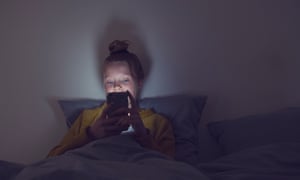Teens, more than anyone, need time spent in solitude, where emotions are processed and the brain powers down
There
are many reasons to fret about our relationship to technology, not
least of which is the way smartphones, and their slot machine-like apps,
have hooked us so thoroughly. Thanks to these miniature overlords many
of us now boast the attention span (and manners) of a toddler, and, like
prisoners on parole, are physically incapable of moving about without
our electronic monitoring devices on us at all times.
When adults behave this way it’s depressing and odd, but when teenagers step into this world – not having known an alternative reality – the problem becomes a social concern.
Health experts have warned of a spike in anxiety and depression in teenagers addicted to smartphones. In her piece in The Atlantic, psychology professor Jean M Twenge argued there is a potential correlation between the uptake in smartphones among “iGens” (born between 1995 and 2012) and increasing rates of youth depression. She writes of kids who spend holidays “hanging out” with their friends online, while rarely leaving the bedroom, let alone the home. Her concerns seemed to be shared by those she is speaking for: a 2018 Pew Research Center survey found that 54% of American teens say they spend too much time online.
Recently, academics and researchers have argued that our fears about
the influence of tech on teen wellbeing are overstated and the science
inconclusive. Andrew Przybylski, the director of research at the Oxford
Internet Institute (OII) and Amy Orben, a researcher at the OII and
lecturer in psychology at the Queen’s College, University of Oxford, have previously argued:
“While it is true that some research suggests that young people who
report higher social media use show slightly lower levels of wellbeing,
most of these findings are unreliable and their conclusions might amount
to little more than statistical noise.”When adults behave this way it’s depressing and odd, but when teenagers step into this world – not having known an alternative reality – the problem becomes a social concern.
Health experts have warned of a spike in anxiety and depression in teenagers addicted to smartphones. In her piece in The Atlantic, psychology professor Jean M Twenge argued there is a potential correlation between the uptake in smartphones among “iGens” (born between 1995 and 2012) and increasing rates of youth depression. She writes of kids who spend holidays “hanging out” with their friends online, while rarely leaving the bedroom, let alone the home. Her concerns seemed to be shared by those she is speaking for: a 2018 Pew Research Center survey found that 54% of American teens say they spend too much time online.
Meanwhile, the founder of the Stanford Social Media Lab, Jeff Hancock, most recently noted: “… if you compare the effects of your phone to eating properly or sleeping or smoking, it’s not even close.”
But this does not mean we should let tech off the hook so easily. While it’s important to not overstate teen tech addiction, nor assume adolescents are a homogeneous group with replica social media habits, it’s worth being wary of what such widespread devotion to these devices represents.
"This over-exposure to smartphones threatens to rob teens of a vital inner world, and this loss is much harder to measure"
These days, it’s harder for kids to disconnect. It’s one thing to feel exhausted by the jostling for power in the social hierarchies during school hours, it is quite another to go home, retreat to your bedroom, log on to social media and discover there is in fact no end to your day: you weren’t invited to that party, your crush is still flirting with someone else, and the bullying has merely moved online.
As every therapist in the world will tell you, we are ineluctably shaped by our childhood years, and a teen with no way of escaping their social paradigm, be it pleasant or destructive, is a person in constant performance mode, or at the very least, steadying themselves for it.
Adolescence for many (if not all teens) also represents a confusing time of uncertain boundaries and competing identities, one they will need to retreat from, to build internal defences against, to learn how to cope with and survive. This over-exposure to smartphones threatens to rob teens of a vital inner world, and this loss is much harder to measure through studies. After all, the childhood curiosity that is never cultivated is hard to track or trace, as is the person you never became or the interests that failed to evolve because you spent your spare time engaging primarily with a phone.
In this sense, you could argue a generation is being denied the means with which to find out who they are, what they love or don’t love, what makes them feel alive. Everything meaningful is realised in that place of disconnection from the social sphere, while meaninglessness swarms online in its infinite iterations.
Doubtless, the debate between researchers over a link between teen anxiety and smartphones will continue, but there is no denying the transformative effect on society when a significant cohort spends more of their developmental years on their phone than off it, and cannot fathom a pre-smartphone reality.
Perhaps we need to prioritise “alone time” as more than just the preserve of over-committed professionals, but a very human right, one that is as important for teens as it is for exhausted parents.
In fact, teens more than anyone need that crucial time spent in solitude, where emotions are processed and the brain powers down; a place to go when the noise of the world drowns you out or you simply want to drown out the world.
• Johanna Leggatt is a Melbourne-based journalist

No comments:
Post a Comment